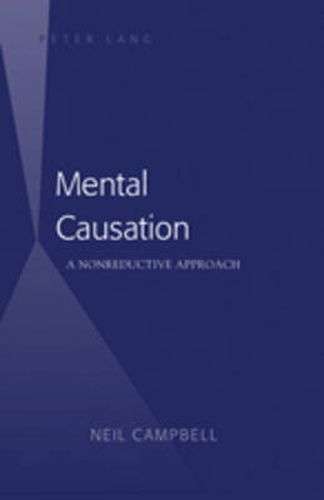Readings Newsletter
Become a Readings Member to make your shopping experience even easier.
Sign in or sign up for free!
You’re not far away from qualifying for FREE standard shipping within Australia
You’ve qualified for FREE standard shipping within Australia
The cart is loading…






How do mental events such as choices and decisions lead to physical action? The problem of mental causation is one of the most important and intriguing philosophical issues of our time and has been at the centre of debates in the philosophy of mind for the past fifty years. In opposition to the recent wave of reductionist theories, this book argues that it is possible to account for mental causation within a nonreductive framework as it adopts a broadly Davidsonian approach to mental causation: reasons cause actions because they are identical to physical events. This work then defends this approach from the frequently raised criticism that it entails epiphenomenalism - the inefficacy of the mental. Moreover, Mental Causation moves beyond Davidson’s views by reconsidering the question of whether reasons causally explain actions, arguing in opposition to Davidson, that explanations appealing to reasons represent a distinct category of explanation from causal explanation. Essential reading for anyone interested in debates about mental causation, this is an excellent text for senior undergraduates, graduate students, and professional philosophers.
$9.00 standard shipping within Australia
FREE standard shipping within Australia for orders over $100.00
Express & International shipping calculated at checkout
How do mental events such as choices and decisions lead to physical action? The problem of mental causation is one of the most important and intriguing philosophical issues of our time and has been at the centre of debates in the philosophy of mind for the past fifty years. In opposition to the recent wave of reductionist theories, this book argues that it is possible to account for mental causation within a nonreductive framework as it adopts a broadly Davidsonian approach to mental causation: reasons cause actions because they are identical to physical events. This work then defends this approach from the frequently raised criticism that it entails epiphenomenalism - the inefficacy of the mental. Moreover, Mental Causation moves beyond Davidson’s views by reconsidering the question of whether reasons causally explain actions, arguing in opposition to Davidson, that explanations appealing to reasons represent a distinct category of explanation from causal explanation. Essential reading for anyone interested in debates about mental causation, this is an excellent text for senior undergraduates, graduate students, and professional philosophers.